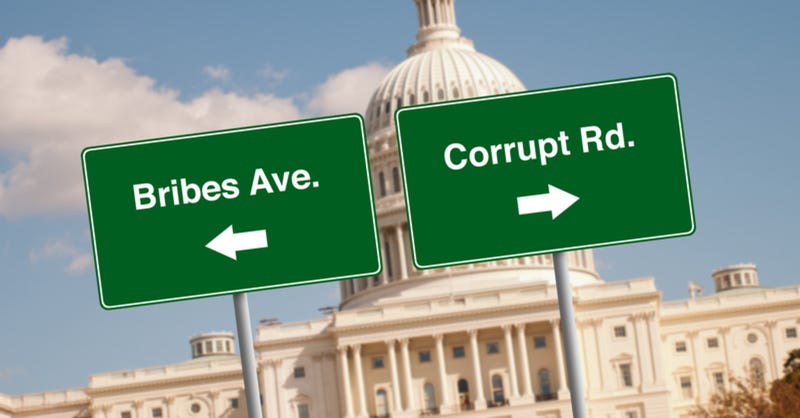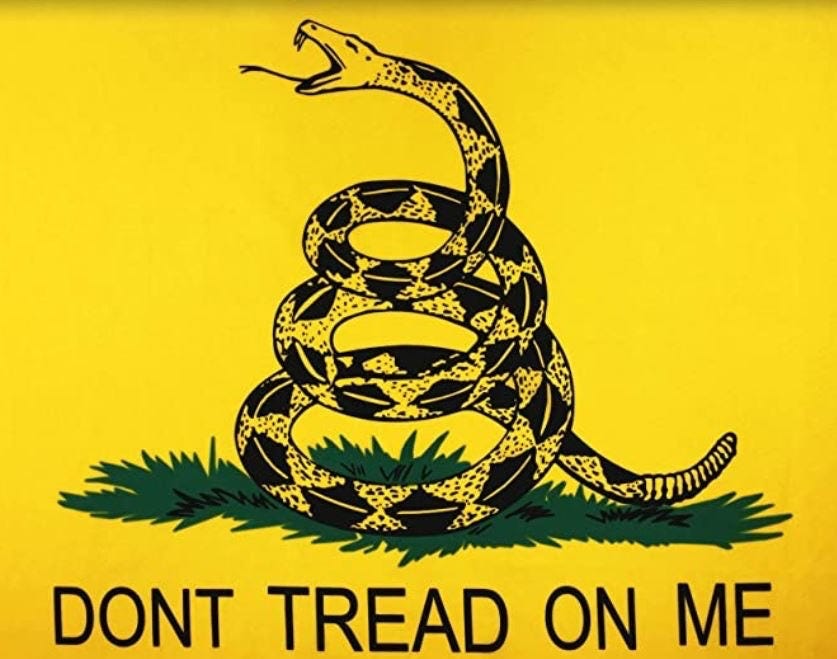Completely Corrupt Congress
While the Framers crafted what they thought to be the best law of the land ever, unfortunately they unwittingly included a couple of Easter Eggs.
Our country is too large to have all its affairs directed by a single government. Public servants at such a distance, and from under the eye of their constituents, must, from the circumstance of distance, be unable to administer and overlook all the details necessary for the good government of the citizens; and the same circumstance, by rendering detection impossible to their constituents, will invite public agents to corruption, plunder and waste.
Thomas Jefferson
Foreword
As Speaks readers know, Your Author is a staunch defender of the United States Constitution as originally intended and written. While the Framers crafted what they thought was the best law of the land ever, unfortunately, as detailed below, they unwittingly included a couple of Easter Eggs. Furthermore, the Constitution has become meaningless for all practical purposes due to harmful amendments and Gumby-like interpretations.
Speech and Debate Clause
Early History
The Speech and Debate Clause of the U.S. Constitution (Article I, Section 6, Clause 1) reads:
The Senators and Representatives shall receive a compensation for their services, to be ascertained by law, and paid out of the treasury of the United States. They shall in all cases, except treason, felony and breach of the peace, be privileged from arrest during their attendance at the session of their respective Houses, and in going to and returning from the same; and for any speech or debate in either House, they shall not be questioned in any other place.
Based on the above, the Constitution gives Congress members:
Salaries, expenses, and other compensation
Freedom from arrest for ordinary reasons while doing their work
Freedom from arrest for anything they may say in Congress
James Wilson (1742-1798), one of the principal architects of the Constitution, in his Lecture on Law (1791) explained the purpose of the clause:
In order to enable and encourage a representative of the publick to discharge his publick trust with firmness and success, it is indispensably necessary, that he should enjoy the fullest liberty of speech, and that he should be protected from the resentment of every one, however powerful, to whom the exercise of that liberty may occasion offence.
In his Commentaries on the Constitution of the United States (1833), Justice Joseph Story wrote that privilege, inherited from Great Britain, was:
…strictly confined to things done in the course of parliamentary proceedings, and [did] not cover things done beyond the place and limits of duty… the same principles seem applicable to the privilege of debate and speech in congress.
The Application
The speech and debate clause protects members of Congress from worrying about anything they say during legislative activities. Therefore, nobody may implicate them in a lawsuit. The privilege procedure may have worked before the overarching corruption we live under today. It has become an extraordinary privilege as Congress members (all parties) are above the law. For a chilling reality, recall that in committee hearings, witnesses cite this oath:
Do you solemnly swear or affirm that the testimony you are about to give is the truth, the whole truth, and nothing but the truth, so help you God?
It would be a meaningful event if a person in the hot seat demanded that every committee member and staff also take the oath. With the gavel pounding mightily, we can hear it now and the chairperson saying, “Witness, you are in contempt!”
Many face indictment, conviction, and sentencing for “lying to Congress.” Nevertheless, congress members can blurt out falsehoods and face zero consequences during official duties. How is this so? These cases illustrate:
Doe v. McMillan (1973): The Supreme Court has held that the clause protects such acts as voting, the conduct of committee hearings, the issuance and distribution of committee reports, the subpoenaing of information required in the course of congressional investigations, and even the reading of stolen classified materials into a subcommittee’s public record.
Hutchinson v. Proxmire (1979): The Supreme Court ruled that Senator William Proxmire did not enjoy protection under the Constitution or the First Amendment for libelous statements made outside Congress.
Office of Senator Dayton v. Hanson (2007): The Supreme Court ruled that lower courts did not have jurisdiction over a former employee’s claim against a U.S. senator’s office. The senator’s office had sought immunity under the speech and debate clause.
The above notwithstanding, the courts ruled that some activities are not protected, as illustrated by these cases:
Gravel v. United States; Hutchinson v. Proxmire (1979): The Supreme Court ruled that speech and debate immunity will not protect Members engaged (even in their official capacities) in such non-legislative activities. That includes negotiations with federal agencies, issuing press releases and newsletters, and the delivery of speeches in their home districts.
U.S. Senator Robert “Bob” Menendez New Jersey (2017): Bob (his preferred name) endeavored to protect himself from allegations of bribery and public corruption. Lower courts ruled that his lobbying activities for particular clients are not protected. The trial proceeded, and lucky Bob got off because of a mistrial. The U.S. Department of Justice abruptly dropped its plan to retry him on bribery and corruption charges.
The key takeaway: members of Congress are not held accountable for any lies told as part of their official work. Congress members are “constitutionally” above the law, and “we the people” cannot trust them. We should reward politicians for telling the truth. But of course, citizens and non-citizens who get fiat money via grants and stimulus checks must have some “trust.” That bribed “trust” is the only thing backing our fiat money. Meanwhile, collectivists get orgasmic over money-breaking socialist crapola, and both sides swoon over despicable “nation-building” funds (debt). That particular “trust” extended to the USSA Global Congress LLC belongs in the trash heap.
General Welfare and Commerce
In 1913, the 16th Amendment enshrined a national income tax, and that same year, the Federal Reserve Act was passed by the 63rd United States Congress and signed into law by President Woodrow Wilson. After that, as we shall see, since 1937, most national laws enacted by Congress are technically unconstitutional. But that fact has neither hindered their passage nor stopped any President from signing blatantly unconstitutional legislation into law. To give the laws passed by Congress a semblance of legality, each legislative act that infringes on States’ rights now requires an enabling bill to be passed by the States to “legalize” legislation. As an added booster shot, the machine gets its way with executive orders, mandates, and agreements in place of legislative action. Why bother with that cranky old parchment called the Constitution?
We are supposed to be a Constitutional Republic, not a dumbocracy. Thus, few realize the usurpation of States’ rights with the ratification of the 17th Amendment (also in 1913). That Amendment took away state legislatures’ right to elect their senators who would look after the interests of each state. With a national election of senators, it is easy for the machine to sway such elections. Copious entitlements overshadow society, thus silencing the people.
The Constitution, as crafted, limited the federal government’s authority. Specifically, it prevents intrusion into the States’ affairs and the people’s lives. The power of the federal government, according to the Constitution, is limited to:1
Building roads
Maintaining a post office
Raising and maintaining military forces to protect the nation from either external or internal aggression
Establishing patent and copyright laws
Establishing maritime laws
Establishing uniform banking regulations, coining money
Declaring war on an aggressor nation (when necessary)2
Concerned that the federal government might usurp additional authority in the future, the Framers inserted the following in the form of the 10th Amendment:
The powers not delegated to the United States by the Constitution, nor prohibited by it to the States, are reserved to the States respectively, or to the people.
While reasonably sure they had covered every contingency, the Framers’ crystal ball must have had a micro-crack. Some of the clauses, like Article I, Section 8 Clause 1, and Clause 3, were broadly interpreted not only by Congress but by the Supreme Court:
The Congress shall have power to lay and collect taxes, duties, imposts, and excises, to pay the debts and provide for the common defense and general welfare of the United States, but all duties, imposts, and excises shall be uniform throughout the United States;
To borrow money on the credit of the United States;
To regulate commerce with foreign nations, among the several states, and with the Indian tribes
Three harmless words opened Pandora’s box: general welfare and commerce. Entitlement spending and precedent-building occur due to these three words. Virtually everything Congress has done for the past eighty years magically “promotes commerce” or “protects the general welfare.” We are children of the national government.
Most of these laws usurped the authority of the States through a fiat legal precedent that federal law supersedes state law. The Supreme Court has almost universally upheld them based, to a large degree, on the 1794 Gibbons v. Ogden case. There, Chief Justice John Marshall (1755–1835) ruled that States could not interfere with the power granted to Congress by passing conflicting legislation. Marshall declared that the commerce power of Congress included everything affecting “...commerce among the states,” thus construing that authority to cover intrastate and interstate commerce. Marshall based his decision on Article I Section 8 Article 3, which states that Congress shall have the power “...To regulate commerce with foreign nations, and among the several states...”
The states were incensed not just by the high court’s clear assertion of federal law’s supremacy over state law but also by its presumption that the federal government could meddle in intrastate commerce agreements. The States retaliated by codifying the 11th Amendment (1795), which declared that:3
The judicial power of the United States shall not be construed to extend to any suit in law or equity, commenced or prosecuted against one of the United States by citizens of another State, or by citizens or subjects of any foreign state.
The 11th Amendment notwithstanding, over the years, the high court has interpreted the commerce clause both to expand or (in rare cases) diminish the federal government’s authority. At the close of the Marshall era (1801–1835), the Supreme Court generally adopted a more restrictive view, choosing to protect the sovereignty of the States over the federal government.
The Supreme Court did not return to the broad view of the commerce clause until 1937, due entirely to Franklin Delano Roosevelt’s threat to force many of them into retirement. The justices capitulated. They did this knowing they opened the door to an unconstitutional centralized government. They did not care. At the moment, it was more important to them to protect both their jobs and the structure of the high court.
Afterword
In a leaked video from March 24, 2022, Congressman Mo Brooks (R-AL) explained how the entrenched corruption in DC works. Here it is from an event for his senate campaign.
Here are the key takeaways from the above video:
Special interest groups run Washington (yes, we know that)
To be chair of a committee, you have to purchase it
The purchase price for a significant committee is one million dollars
You have to get it (money) from the special interest group, and there is a quid pro quo
Did that news reach CNN, ABC, Fox, et al.? Not at all because Mo is pro-MAGA, and thus he is an “extremist” according to Joe Biden, so the information must be disinformation. But to be sure, follow the “Hunter laptop protocol” (no reporting). Furthermore, the Disinformation Governance Board (Biden 1984-like Ministry of Truth) is right on it like white on rice.
There is little effort in addressing honor, integrity, ethics, and accountability. The congressional “Ethics Committees” exist for show purposes. Our “leaders” know that most people are out of touch with reality to know better. Corrupt Congress is in bed with crooked big business and loony leftist non-government organizations. It is an evil machine. Those who have touched the third rail of this machine have faced a terrible fate. Hey Joe Biden, your minions and dopey sheeple, now hear this: The Real Extremists are in Washington, D.C.
It is all just a colossal train wreck.
Sources
I warmly encourage you to consider becoming a paid subscriber if you have the means. Regardless of your choice, your support is deeply appreciated. From the bottom of my heart, thank you for your invaluable support!
From Frederick R. Smith Speaks Nude Jersey Shore, an example of what the Framers did not envision:
The National Institutes of Health (NIH) funneled taxpayer monies to fund sex studies at the Kinsey Institute, evidenced by a $26,000 grant for a July 2003 conference. That soiree included a discussion about “… the relationship ... between sexual motivation and arousal,” plus “guidelines for ... measurement of sexual response …” One of the speakers at the Kinsey conference was Northwestern University psychology professor J. Michael Bailey. Our illustrious friends at the NIH had supplied Bailey with a $147,000 grant. The research: pay women to view pornography while using an instrument called a “plethysmograph.” So, what was the goal of this study? To measure the sexual responses of the women watching the porno flicks.
It is a coincidence that the leader of the NIH’s sister agency, the National Institute of Allergy and Infectious Diseases (NIAID), is the shy Anthony Fauci (since 1984). We can certainly have the utmost confidence in our Covid guidance from the same agency that funded Kinsey Institute research. Most notable is the above NIH-funded research that paid women to view pornography. Such research fits as snugly as a bug in a rug with Amaze pre-teen sex-ed videos.
Congress approved its last formal declaration of war during World War II. Since then, it has agreed to resolutions authorizing the use of military force. So, everything post-WW2 is simply unconstitutional.
Article V of the United States Constitution outlines basic procedures for a constitutional amendment.
Congress may submit a proposed constitutional amendment to the states if the proposed amendment language is approved by a two-thirds vote of both houses.
Congress must call a convention for proposing amendments upon application of the legislatures of two-thirds of the states (i.e., 34 of 50 states).
Amendments proposed by Congress or convention become valid only when ratified by the legislatures of, or conventions in, three-fourths of the states (i.e., 38 of 50 states).






Stock Trades Are CORRUPTING Congress’s Decisions. We Have Proof. https://youtu.be/MvDfigzy6fs
Great post. I didn’t know this history. New dystopian red pills daily.